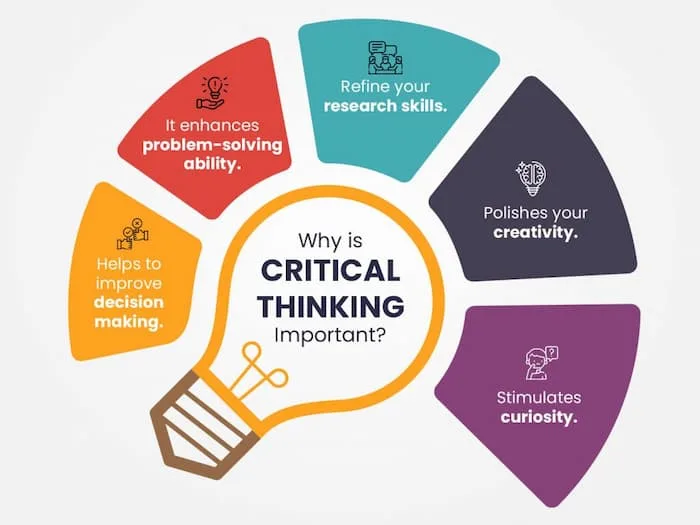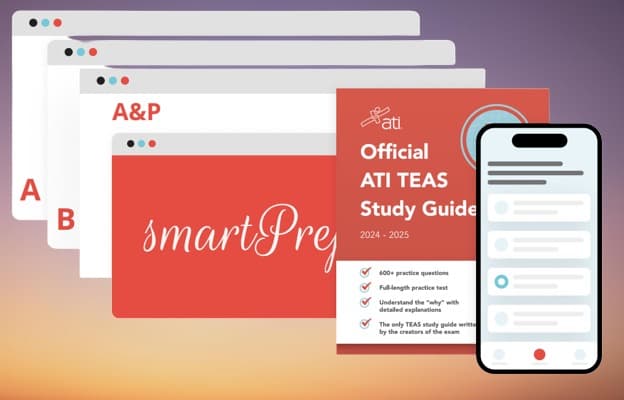Introduction
Analyzing information, evaluating situations, and making sound judgments are vital for success in nursing school and throughout your healthcare career. The TEAS heavily emphasizes critical thinking skills, making it a key area to focus on during your test preparation. But the benefits extend far beyond the exam itself.
Understanding Critical Thinking in the TEAS Test
The TEAS test isn’t just about memorizing facts and figures. It delves deeper, assessing your critical thinking prowess – a crucial skill for aspiring nurses. But what exactly does critical thinking mean in the context of the TEAS?
Here’s a breakdown:
- Critical Thinking Defined: In the TEAS, critical thinking refers to your ability to analyze information, identify patterns, and draw logical conclusions. It’s about going beyond the surface level and applying your knowledge to solve problems and make sound judgments.
- Testing Your Reasoning Skills: The TEAS assesses different aspects of critical thinking, including:
- Critical Reasoning: Can you identify assumptions, biases, and flaws in arguments presented in reading passages or scenarios?
- Analytical Thinking: Can you break down complex information, identify critical points, and draw logical connections?
- Logical Reasoning: Can you apply established rules and principles to solve problems and reach valid conclusions?
How To Build Your Critical Thinking Abilities
1. Analytical Thinking Strategies
Equipping yourself with the right strategies can transform these challenges into opportunities to showcase your analytical prowess. Here’s your toolkit:

How To Unmask Assumptions
Assumptions are hidden beliefs that often underlie arguments or scenarios. Here’s how to spot them:
- Look for Unstated Claims: Identify statements presented as facts without supporting evidence. These could be underlying assumptions.
- Consider Opposites: If a conclusion seems overly dramatic, question the assumptions that might lead to such an extreme outcome.
- Imagine Alternatives: Could the situation be explained differently? Explore alternative explanations to identify potential assumptions.
How To Evaluate Arguments & Evidence
TEAS scenarios often present arguments with varying degrees of strength. Here’s how to assess them:
- Identify Biases: Are there any slanted perspectives influencing the argument? Can you identify the source of the bias?
- Check for Missing Evidence: Does crucial information seem absent? Look for gaps in the logic that could weaken the argument.
- Weigh the Evidence: Is the evidence presented relevant and sufficient to support the conclusion?
How To Draw Supported Conclusions
Don’t jump to conclusions! The TEAS rewards those who can analyze information logically. Here’s how to form firm conclusions:
- Connect the Dots: Link different information in the question or passage to reach a logical conclusion.
- Eliminate Unlikely Options: Can you identify answer choices contradicting the provided information?
- Choose the Most Supported Option: Select the conclusion that best aligns with the presented evidence and reasoning.
2. Logical Reasoning Tips
The TEAS test isn’t just about memorizing facts; it’s about applying logic to solve problems. Here are some powerful strategies to strengthen your logical reasoning and dominate the TEAS:
How To Recognize Patterns
The TEAS loves to test your ability to identify patterns and trends. Here’s how to become a pattern-spotting pro:
- Analyze Relationships: Look for connections between different pieces of information presented in questions or passages.
- Identify Sequences: Are there repeating patterns or sequences in the answer choices?
- Consider Cause & Effect: Can you identify cause-and-effect relationships within the information provided?
How To Make Logical Deductions
The TEAS challenges you to draw logical deductions based on the information presented. Here’s how to become a deduction master:
- Apply Rules & Principles: Can you identify established rules or principles relevant to the scenario? Use them to make logical deductions.
- Identify Implications: What are the potential consequences of the information presented?
- Eliminate Illogical Options: Can you identify answer choices that contradict the established rules or logic of the scenario?
How To Evaluate Evidence
Here’s how to assess the strength and validity of evidence in TEAS scenarios:
- Check for Relevance: Does the evidence directly connect to the conclusion being drawn?
- Consider Sufficiency: Is there enough evidence to support the conclusion without a doubt?
- Look for Flaws: Are there any weaknesses or inconsistencies in the evidence?
How To Apply Critical Thinking In The TEAS Test
By sharpening critical thinking skills, you can significantly enhance your performance across all sections of the TEAS test. Let’s explore how critical thinking is applied to each section of the exam;
How To Apply Critical Thinking In The Reading Section
The TEAS reading passages aren’t just about understanding basic facts. They challenge you to analyze, interpret, and draw inferences. Strong critical thinking allows you to:
- Uncover Underlying Meanings: Go beyond the surface level and identify the author’s main points, supporting arguments, and potential biases.
- Draw Inferences: Use the information presented to make logical deductions and predictions about the topic.
- Analyze Cause & Effect: Identify how different factors mentioned in the passage influence each other.
How To Apply Critical Thinking In The Science Section
The TEAS science section throws various research data and results in your way. Critical thinking empowers you to:
- Evaluate Research Design: Analyze the methodology used in the research and identify any potential limitations.
- Interpret Data: Make sense of the questions’ graphs, tables, and other scientific data.
- Draw Evidence-Based Conclusions: Use the research findings to reach logical conclusions about the tested scientific concepts.
How To Apply Critical Thinking In The Math Section
The TEAS math section isn’t just about putting numbers into formulas. Critical thinking allows you to:
- Analyze Problem-Solving Steps: Break down multi-step math problems into smaller, manageable parts and identify the most efficient approach.
- Evaluate Answer Choices: Don’t just calculate; analyze! Critically evaluate if the answer choices make sense in the context of the problem.
- Estimate and Eliminate: Use estimation to identify answer choices that are way off the mark and eliminate them, saving you valuable time.
How To Apply Critical Thinking In The English and Language Usage Section
The TEAS English and Language Usage section isn’t just about grammar rules and sentence structure. Critical thinking empowers you to:
- Identify Flaws in Arguments: Analyze sentences or short passages for logical fallacies or biased language.
- Evaluate Word Choice: Consider the impact of specific word choices on the meaning and tone of the sentence.
- Discern Ambiguity: Identify sentences with multiple interpretations and choose the option that best conveys the intended meaning.
Strategies to Enhance Critical Thinking Skills
Here are some strategies to keep your critical thinking skills in top shape:
- Engage in Active Learning: Don’t just passively memorize facts. Question, analyze, and connect information from different sources. Debate topics with classmates or friends and explore other perspectives.
- Practice Everyday Problem-Solving: Look for opportunities to apply critical thinking daily. When faced with a decision, analyze options, weigh pros and cons, and choose the most logical course of action.
- Embrace Puzzles and Games: Crosswords, Sudoku, logic puzzles, and even strategic board games can challenge your thinking and problem-solving skills in a fun way.
- Read Widely and Deeply: Expose yourself to diverse viewpoints and complex topics. Reading non-fiction, historical accounts, and philosophical essays can stimulate critical thinking and analysis of information.
- Take Online Courses: Numerous online resources offer courses and exercises specifically designed to enhance critical thinking skills.
- Mindfulness and Meditation: Practice mindfulness and meditation techniques to sharpen your focus and improve your ability to analyze information.
Bonus Tip: Journaling can be a powerful tool for critical thinking. By writing down your ideas and observations, you can reflect on your experiences, analyze your thought processes, and challenge your assumptions.
By incorporating these TEAS test critical thinking skills into your routine, you’ll develop a sharper, more critical mind that will help you conquer the TEAS test and serve you well throughout your nursing career.
How To Apply Critical Thinking in Nursing
The TEAS test emphasizes critical thinking for a reason – it’s an essential skill that transcends test scores and becomes your trusted companion throughout your nursing career. Imagine this:
- A patient arrives in the emergency room with chest pain and shortness of breath. Critical thinking allows you to analyze their symptoms, medical history, and vital signs to identify potential causes – a heart attack, pulmonary embolism, or even anxiety.
- A diabetic patient’s blood sugar levels are unexpectedly high. Critical thinking empowers you to assess their diet, medication adherence, and activity levels to determine the underlying cause and adjust their care plan accordingly.
- A postoperative patient experiences a sudden drop in blood pressure. Using critical thinking, you quickly analyze their vital signs, medications, and pain levels to identify potential complications and take timely action to stabilize the patient.
These are just a few examples of critical thinking skills used daily in nursing. It’s the foundation for:
- Analyzing Patient Data: Effectively interpreting vital signs, lab results, and other patient data to make informed decisions about their care.
- Formulating Diagnoses: Drawing logical conclusions based on patient information to identify potential medical conditions.
- Developing Treatment Plans: Creating individualized care plans that address the specific needs of each patient, considering their medical history, current condition, and treatment options.
- Providing Patient Education: Explaining complex medical information to patients and their families clearly and understandably, promoting informed decision-making.
- Ensuring Patient Safety means constant vigilance, anticipating potential complications, and taking proactive measures to keep patients safe.
Conclusion
Passing the TEAS test is a big step towards becoming a nurse, but critical thinking is the superpower that will propel you forward throughout your career. Mastering this skill will transform you from a test-taker into a confident and capable caregiver. Critical thinking is a continuous journey, so keep challenging yourself and seeking opportunities to grow. Remember, the stronger your essential muscles of thinking are, the brighter your future as a nurse will be.
This guide has equipped you with TEAS test critical thinking skills to succeed on the exam and kickstart your nursing journey with a solid foundation in critical thinking. Now go forth and practice! Apply these skills daily, explore additional resources, and face the TEAS confidently. With dedication, you’ll conquer the test and develop a critical thinking arsenal that will serve you well for years to come.




